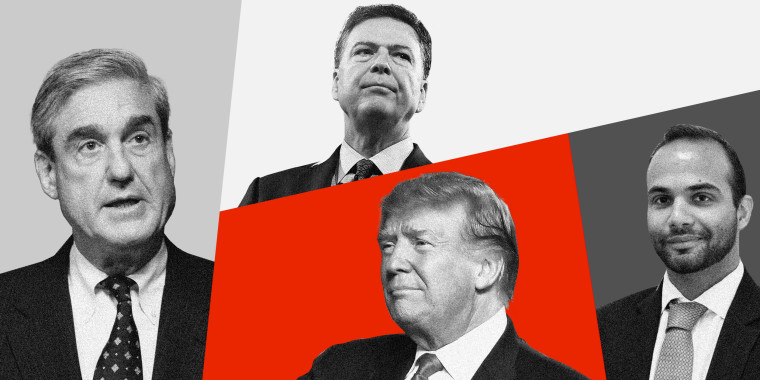"Donald Trump got into trouble here when a chat over wine turned to Russian hacking," reads a plaque outside the Kensington Wine Rooms in London — the birthplace of the Mueller investigation, which reached its conclusion on Friday.
A foreign policy adviser for the Trump campaign, George Papadopoulos, had gone to the wine bar in the Notting Hill section to have drinks with an Australian diplomat in May 2016. While there, Papadopoulos reportedly told the diplomat, Alexander Downer, that he'd heard that Russia had thousands of emails that would embarrass Trump's presidential rival, Democratic nominee Hillary Clinton.
After thousands of emails stolen from the Democratic National Committee were posted online in the lead-up to the party's nominating convention that July, the Australian government reported Papadopoulos' remarks to the FBI. That sparked a nearly two-year investigation that would span the globe and repeatedly rock the Trump administration.
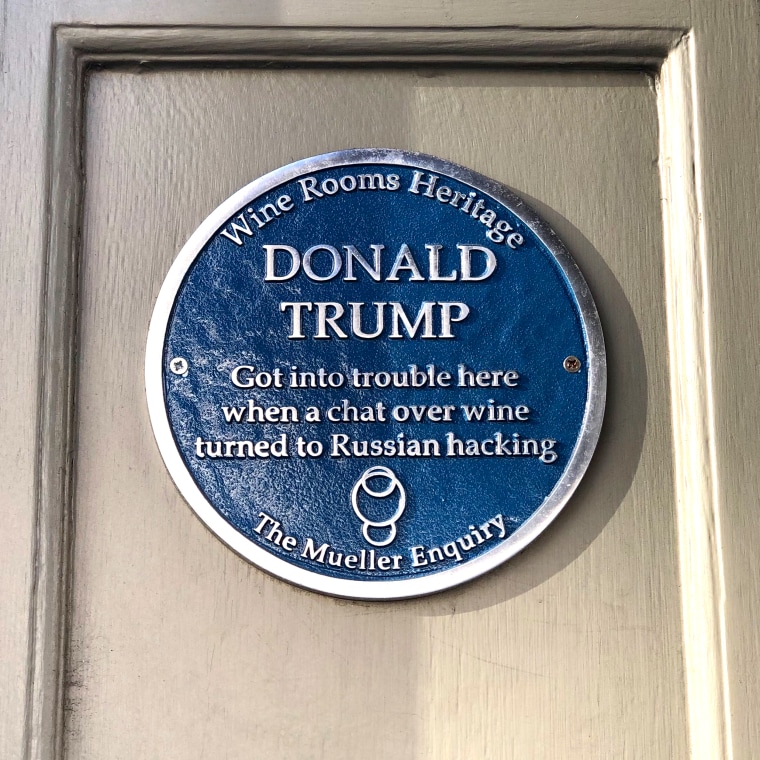
Special counsel Robert Mueller's report — submitted to Attorney General William Barr, who said he may be able to brief congressional leaders on the report as soon as this weekend — is the culmination of an effort that included his team's reviewing millions of pages of documents from around the world and questioning witnesses from the highest echelons of the Trump administration, including John Kelly and Reince Priebus, both former White House chiefs of staff; former Attorney General Jeff Sessions; and ex-White House counsel Don McGahn. Trump ultimately refused to sit for an interview with Mueller, but he submitted written responses to some of the special counsel's questions.
Download the NBC News mobile app for breaking news alerts and full coverage of the Mueller report.
To date, 34 people and three companies have been criminally charged in the massive probe, including Papadopoulos; former White House national security adviser Michael Flynn; Trump's former campaign chairman Paul Manafort and deputy campaign chair Rick Gates; political adviser Roger Stone; personal lawyer Michael Cohen; and numerous Russians. There have been seven guilty pleas and one conviction, but none of the charges specifically accused anyone in Trump's orbit of colluding directly with the Russian intelligence operation to help Trump get elected in 2016.
Mueller was named special counsel in May 2017 by Deputy Attorney General Rod Rosenstein, who tasked the former FBI director with investigating "any links and/or coordination between the Russian government and individuals associated with the campaign of President Donald Trump" and "any matters that arose or may arise directly from the investigation."
"I accept this responsibility and will discharge it to the best of my ability," Mueller said in a statement at the time.
The appointment came eight days after Trump fired FBI Director James Comey, who'd been leading the investigation into Russian meddling and any possible Trump campaign involvement since the Papadopoulos revelations. The probe had been kept under wraps until March 2017, when Comey publicly revealed its existence during a congressional hearing.
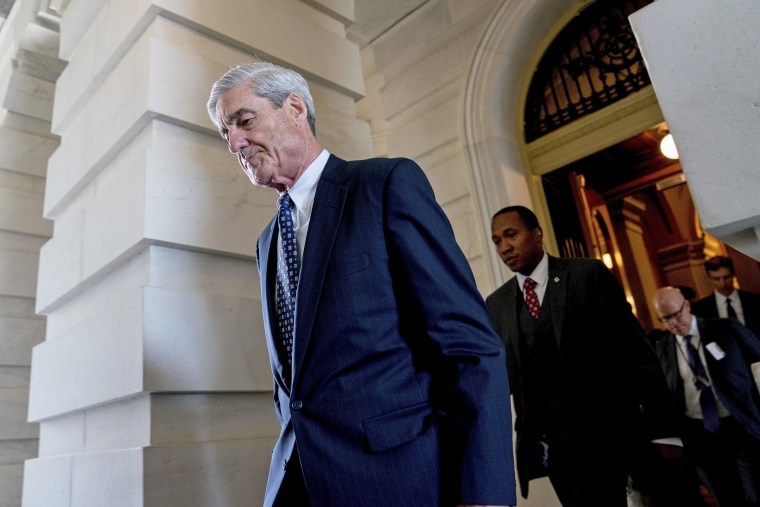
Trump initially said he'd axed Comey at the urging of Sessions and Rosenstein, citing Comey's handling of the FBI probe into Hillary Clinton's use of a private email server while secretary of state. But two days later, Trump told NBC News' Lester Holt that it was his decision, and that his reasoning involved the Russia probe.
"And in fact when I decided to just do it, I said to myself, I said you know, this Russia thing with Trump and Russia is a made-up story, it's an excuse by the Democrats for having lost an election that they should have won," Trump told Holt, increasing law-enforcement concerns that the president was trying to obstruct the Russia investigation.
A day after Comey's firing, Trump hosted two top Russian diplomats in the Oval Office and again raised the Russia investigation in the context of Comey's firing.
"I just fired the head of the FBI. He was crazy, a real nut job," Trump told the visitors, according to The New York Times. "I faced great pressure because of Russia. That's taken off."
Rosenstein named Mueller as special counsel one week later — a day after the decorated war veteran and former FBI director had been interviewed by Trump for Comey's job.
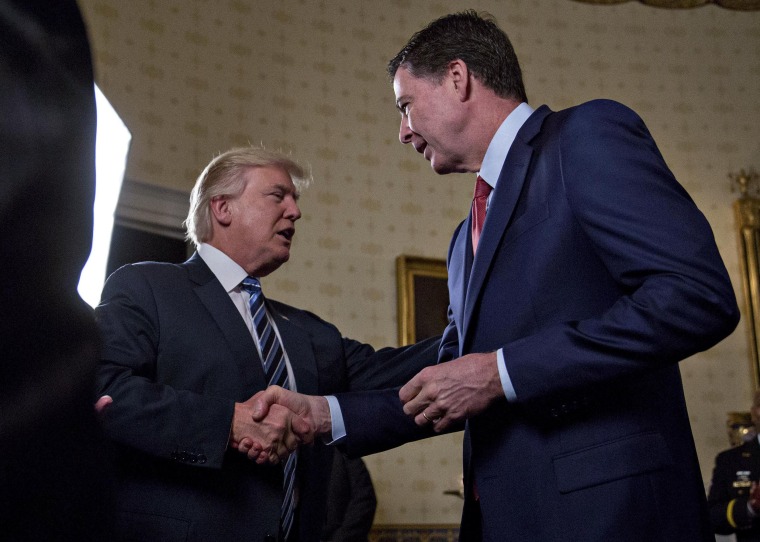
Mueller’s appointment was hailed by Democrats and Republicans, with then-Rep. Jason Chaffetz, R-Utah., praising his "impeccable credentials" and Sen. Susan Collins, R-Maine, calling him "above reproach."
Trump felt differently, lambasting Mueller's probe as a "witch hunt" and a "hoax."
The president moved to have Mueller fired in June of that year, just weeks after he was appointed, but backed off when White House counsel McGahn threatened to resign in protest, a source told NBC News. The New York Times reported that Trump had complained that Mueller had conflicts of interest, in part because of a years-old dispute over fees at the Trump National Golf Club in Sterling, Virginia. The president later claimed — falsely — that Mueller was "best friends" with Comey.
Trump repeatedly referred to Mueller’s investigators as "angry Democrats," although Mueller is a Republican, as is Rosenstein, who oversaw the investigation. And the president singled out some who'd been assigned to the case by name, including FBI agent Peter Strzok and bureau lawyer Lisa Page. Strzok was reassigned after it emerged that the two, who were having an affair, had exchanged texts criticizing Trump, while Page had left her brief detail with the special counsel's office before those texts came to light, a Mueller spokesman said.
Mueller, a former Marine, and his team have stayed remarkably silent during the sometimes daily deluge of criticism from the president, mostly letting their court filings do the talking. His office did issue a rare statement in January disputing a BuzzFeed report that said his team had evidence that Trump had directed Cohen to lie in congressional testimony about plans for a Trump Tower in Moscow. The report had sparked talk of impeachment from some Democrats.
"I appreciate the special counsel coming out with a statement last night," Trump told reporters the next day. "I think it was very appropriate that they did so."
Hacked emails and Putin
Mueller's team had plenty of evidence awaiting them by the time they went to work.
U.S. intelligence agencies had concluded that Russian operatives had hacked the Democratic National Committee emails and others belonging to Clinton campaign chairman John Podesta. The first Podesta emails were published online by WikiLeaks shortly after the "Access Hollywood" scandal, in which Trump bragged on a decade-old tape about grabbing women by their genitals without their consent, threatened to torpedo Trump's presidential hopes.
At one point during the campaign, Trump even publicly asked for hackers' help. "Russia, if you’re listening, I hope you're able to find the 30,000 emails that are missing," he said at a news conference in July 2016, referring to emails Clinton had deleted. Trump later said the comment had been a joke.
There was also Trump's deference to Russian President Vladimir Putin.
Trump — who’s unleashed his brash, trash-talking style on friends and foes alike — tweeted about Putin as early as June 2013 as he was preparing to bring his Miss Universe pageant to Russia, asking if the Russian president would "become my new best friend?"
Trump later vacillated on whether he'd ever met Putin, whom he regularly praised as a "tough" and "strong" leader. At times he said they had a great relationship; he told Fox News in 2014 "he could not have been nicer. He was so nice, and so everything." After he launched his presidential campaign, he said they'd never met and had no relationship.
While U.S. intelligence agencies identified Russians as the hacking culprits during and after the campaign, Trump has remained skeptical.
"I mean, it could be Russia, but it could also be China. It could also be lots of other people. It also could be somebody sitting on their bed that weighs 400 pounds, OK?" he said during the first presidential debate in September 2016.
Trump struck a similar note in July of last year while standing by Putin's side in Helsinki just days after Mueller's team indicted 12 Russian intelligence officials for interfering in the election. An earlier Mueller indictment had laid out how Russian operatives used social media to sow discord and boost Trump's campaign — all this, in addition to being told by the U.S. intelligence community in January 2017 that Putin had personally directed election interference to try to help Trump win.
"I have great confidence in my intelligence people," Trump said in Helsinki. "But I will tell you that President Putin was extremely strong and powerful in his denial today." He also said Putin "just said it's not Russia. I will say this: I don't see any reason why it would be." A day later, amid mounting criticism, he said he had misspoken.
Trump had long denied that he or his campaign had anything to do with Russia — claims that have not held up since the probe started.
Papadopoulos told ABC he repeatedly tried to set up a meeting between Trump and Putin during the campaign.
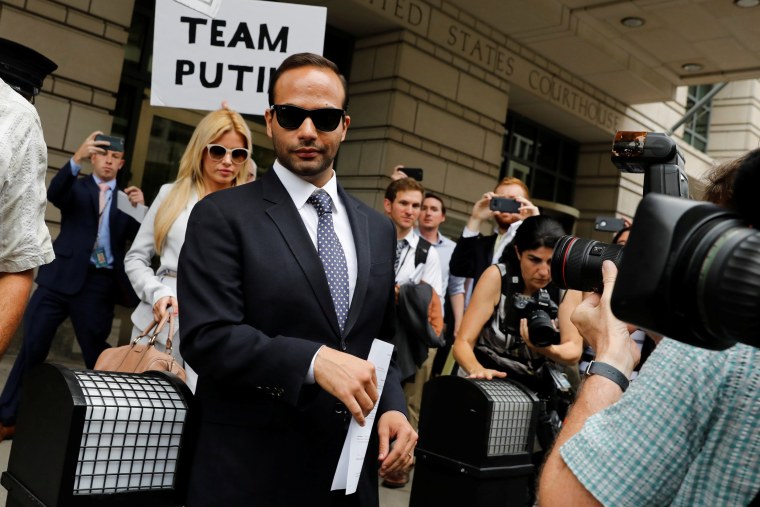
Manafort wound up stepping down as campaign chairman because of questions about his ties to the pro-Russian government in Ukraine.
Flynn had sat with Putin at a dinner for the Russian government-funded television network Russia Today in Moscow in 2015, and neglected to report that he'd been paid for the appearance on his security forms. He would be fired from his job as national security adviser for misleading Vice President Mike Pence about his conversations with the Russian ambassador to the United States. Comey later told Congress that Trump had urged him to drop the FBI's investigation into whether Flynn lied about those talks to investigators; the president has repeatedly denied Comey's allegation.
Cohen and Trump associate Felix Sater were in talks during the campaign to develop a Trump Tower in Moscow, including a proposed multimillion-dollar penthouse for Putin.
Sessions had undisclosed contacts with the Russian ambassador during the campaign, which resulted in his decision to recuse himself from overseeing the Russia investigation, much to Trump's consternation.
The president's eldest son, Donald Trump Jr., set up a meeting at Trump Tower with a Kremlin-linked lawyer and her Russian entourage after they offered unspecified Russian government "dirt" on Clinton.
"If it's what you say, I love it," Trump Jr. said in an email accepting the meeting, which would include Manafort and Trump son-in-law, Jared Kushner.
At the meeting, however, the Russian lawyer instead turned the conversation toward possibly repealing the Magnitsky Act, which sanctions Russian officials for human rights abuses.
The president has tried to downplay the importance of the sit-down, tweeting: "Most politicians would have gone to a meeting like the one Don jr attended in order to get info on an opponent. That's politics!"
Trump's lawyers later acknowledged that the president had been involved in drafting a misleading statement about the meeting on his son's behalf.
Lashing out
Trump's gone on the offensive in other ways as well.
He's contended the entire Russia probe was illegitimate because it used a dossier of reports compiled by a former British spy, Christopher Steele. Steele was hired by a research firm, Fusion GPS, that initially had been retained to get information on Trump by a conservative website, The Washington Free Beacon, during the primaries. After Trump secured the nomination, the Clinton campaign and the Democratic Party started paying for Fusion’s research, at which point the firm hired Steele.
Shortly after, Steele reportedly went to the FBI because he was alarmed by the initial information he had collected. That information alleged Russia had sought to cultivate and support Trump for several years and had compromising information on him, including salacious stories about the candidate's personal behavior. Other memos that went into the dossier would describe Moscow's hacking efforts and allege collusion between members of the Trump campaign team and Moscow.
"So we now find out that it was indeed the unverified and Fake Dirty Dossier, that was paid for by Crooked Hillary Clinton and the DNC . . . which was responsible for starting the totally conflicted and discredited Mueller Witch Hunt!" Trump tweeted last August.
Trump has also sounded off in ways that legal experts say could be seen as pressuring witnesses in the case.
He has publicly weighed the possibility of giving Flynn a presidential pardon, and praised Manafort for initially refusing to cop a plea — even though he'd been convicted of cheating the U.S. government out of millions of dollars in tax revenue.
Cohen — who told investigators that Trump was aware of his hush-money payments to a porn star and Playboy model who allege past affairs with the president — was labeled a "rat" by his former boss. Trump even suggested Cohen's family members should be investigated.
Cohen has been sentenced to three years in prison for, among other things, lying to Congress to conceal that negotiations over the proposed Trump Tower project lasted well into the Trump campaign. Cohen said he lied to support Trump's "political messaging and out of loyalty" to the candidate, who had repeatedly disavowed commercial and political ties between himself and Russia.
Manafort, who was convicted in one case and pleaded guilty in another, is awaiting sentencing, as is his former business partner Gates, who has cooperated with the probe. Flynn is awaiting sentencing for lying to the FBI, while Stone is awaiting trial for making false statements and witness tampering.
Papadopoulos, who prosecutors say was told about the stolen DNC emails by a professor with ties to Russian intelligence, served 14 days behind bars for lying to investigators about the timing of his interactions with the professor, suggesting they happened before he started working for Trump.
